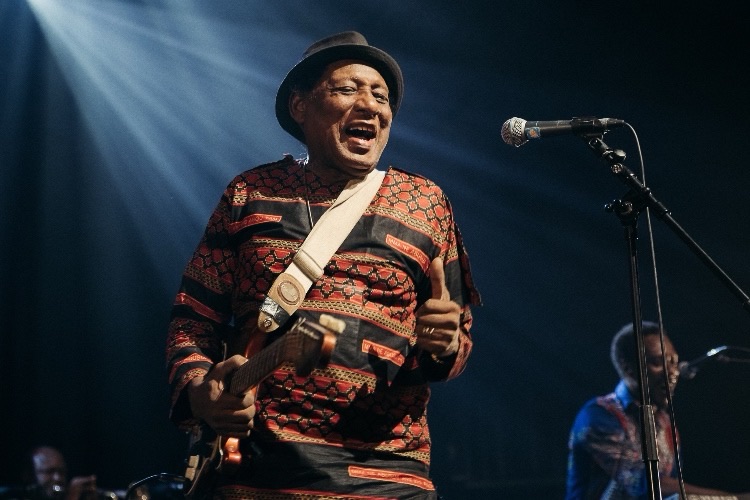Many define “jazz” as the meeting of African rhythms and European harmonies. In a sense, this narrative is accurate – if you remove the influence of the church, songs of the field, or cues from the homeland – the form would cease to exist. But, in another sense, this effort to identify broad sources subjugates nuance in favor of narrative simplicity. While there is an undeniable pan-African aesthetic with elements like call and response, the cultures of the Western continent are not identical. The true differences are perhaps best seen when hues of “America’s Classical Music” return to Africa. Nigerian Afrobeat is distinct from Ghanaian highlife, which becomes evident when comparing two releases by the Jazz is Dead series: Tony Allen JID 018 (2023) and Ebo Taylor JID 022 (2025), even as the lines become increasingly muddled.
Born in the early Twentieth Century, the king of highlife music is the guitar. Built around a two-finger plucked arpeggiated approach, early progenitors of the form drew from the rhythmic complexity of the Afro-Cuban guajeo. The songs were mostly in major modes and songs by people like “The King of Highlife,” E.T. Mensah or Sir Victor Uwaifo were rhythmically rich but often more laid back and designed for mid-tempo dance. By contrast, many think of the Afrobeat style created by Fela Kuti and Tony Allen in the 1960s as much more frenetic, up-tempo, and in minor modes. The guitar is generally less at the forefront. JID 018 does well in displaying this approach with one of the music’s founding fathers.
But here is where things get interesting. The sounds of highlife and Afrobeat are distinguishable and identifiable. But each style does not live in a vacuum. Instead, there is a cycle of mutual artistic reinforcement. Highlife was one of Afrobeat’s top guiding inspirations. But simultaneously, one of the most important names of contemporary highlife – guitarist-vocalist Ebo Taylor – was good friends with Kuti. They informally studied jazz and other music together and elements of Afrobeat inevitably seeped into Taylor’s approach to highlife.
The result is songs like those on JID 022 which honor Taylor’s traditional path without narrowly defining it. A song like the closer “Feeling” is more propulsive and urgent sounding than the works of someone like Mensah or Uwaifo. And yet, the essence of the highlife lineage that developed in the Land of the Rising Sun is undeniably built into the piece. This balancing of history and modernity is an excellent fit for the Jazz is Dead team. Label founders Ali Shaheed Muhammad and Adrian Younge have their feet in both the worlds of jazz and hip hop, themselves effectively continuing the legacy of a musical form that came before while tying it to a branch born of the same roots.
Now eighty-nine, Taylor will temporarily leave his longtime home in the small city of Salt Pond for a cross-country farewell tour of America. Joined by his longtime collaborator Pat Thomas, the guitarist will bring his distinctive sound and inspired lyrics on love, loss, and spirituality to audiences who have far too long overlooked the significance of his contributions to not only African music but all music.
We corresponded with Taylor via email on his Jazz is Dead album, his career, and his upcoming tour. The conversation has been edited for clarity.
PostGenre: You have been making music professionally for almost seventy years. But it seems it has been only the last decade or two that you have received much attention in the US. Do you credit the internet for that?
Ebo Taylor: Yes, I will credit the internet. My management team and I have a comprehensive strategy in place to promote me as an artist and my music, and much is being done on the internet.
PG: The decreased attention in the United States may also be tied to the fact you were not touring here until recently. Why did it take until 2023 for you to perform in the United States?
ET: I would say it was the appointed time. Perhaps I am destined to spend my latter days performing in America.
PG: In terms of Jazz is Dead specifically, what first interested you in working with Ali and Adrian?
ET: Adrian Younge and Ali Shaheed Muhammad always had great ideas and a very strong collaborative attitude. I love their zeal to urge me to go on when I definitely wanted to lay back. And the result is the beautiful record we have, which is a testament to the link between African and American music.
PG: Adrian and Ali have a foot in both jazz and hip hop. Your song “Come Along” has been sampled somewhat heavily in hip hop. Do you see its sampling as a further development of those connections between African and American music?
ET: Yeah, that’s right. But I would also note that there are other Western ideas in my music as well. For instance, I studied Dvorak’s New World Symphony in detail at music school, and that has shaped my works through its complexity. But I also have always wanted my work to gain more recognition and for others to appreciate my music, so have not created music that is complex solely for the sake of complexity.
PG: As for the African side, you are a master of both highlife and Afrobeat. Do you see a significant distinction between the two when you are playing them, or do you see it all as different manifestations of pan-African music?
ET: There’s a significant distinction between highlife and Afrobeat. Basically, Ghanaian highlife is all in a major mode. Only a few [songs] are in minor modes. [By contrast,] Afrobeat is mostly in minor modes. Highlife and Afrobeat are Pan-African music with different manifestations, I would say.
PG: Do you know why, at least here in the United States, it seems people discuss Afrobeat much more frequently than highlife?
ET: I think it’s because [Afrobeat] is the fusion of traditional music, jazz, Fuji, and soul with American funk. Afrobeat’s fusion of different styles has created a unique sound that appeals to wide audiences.
PG: As to the Afrobeat side, you were friends with Fela Kuti. Do you have a favorite memory of your times with him?
ET: In 1961, I went to a private music school in London, the Eric Gilder School of Music. At that time, Fela was studying at Trinity College, and we became friends. Fela was a year ahead of me when I enrolled in music school. He was frisky but very fun to be with. Our friendship grew stronger because we had a common interest in Highlife. We also had the desire to become a Miles Davis, a Charlie Christian, or a Kenny Burrell. So we had the same mood. Fela taught me harmonies. He was such a playful and lively person.
PG: As far as Miles Davis, you have listed him as perhaps your greatest influence from jazz music. Do you feel his influence can be heard in your music?
ET: Yes, though I wish I could show more of it.
PG: But you also didn’t abandon the connections to your roots. You have referenced traditional stories in your music through songs like “Ayesama.” How important is tradition to your music?
ET: Tradition plays a significant role in my music. I would simply say that it presents cultural heritage. Musical traditions are often passed down from generation to generation, serving as a vital link to a community’s history and cultural identity. History has to be protected.
PG: Tied to that, your maternal grandmother was from Mali, which has a rich history of griots sharing important lessons through music. Do you see your music as a continuation of that tradition?
ET: Of course, yes. I am glad that I’m part of the lineage. That pedigree has really impacted my career.
PG: You have also lived in Saltpond most of your life. Do you feel that staying in that town can be heard in your music in some way compared to if you had permanently moved to London back in the 1960s or some other very large city?
ET: I would say Saltpond is in me. The rhythm of the coast takes your mind to Highlife and its associated forms of music.
PG: You indicated in another interview that, when not making music, you like to be alone to relax and reset. Do you find these moments of solitude are where you find your musical inspiration?
ET: Yeah, such moments are very refreshing and rejuvenating experiences. They help me clear my mind and form new ideas about life and my music.
PG: As part of the Jazz is Dead tour, you will perform with fellow Ghanaian musician Pat Thomas. You have collaborated with Pat for decades. What is it about his approach to music that you feel fits so well with your own?
ET: Pat Thomas takes criticism seriously. Whenever he receives negative feedback about a song or performance, he always tries to look for a way to turn it into a learning experience. That has improved his music performance and shaped the direction of his creative work. I would love to work with him any day, any time.
‘Ebo Taylor JID 022’ will be available on January 31, 2025. It can be purchased through Jazz is Dead’s website or Bandcamp page. Taylor’s farewell tour of the United States kicks off in Chicago on April 7, 2025. It will be in Austin at Radio/East on May 1st.






